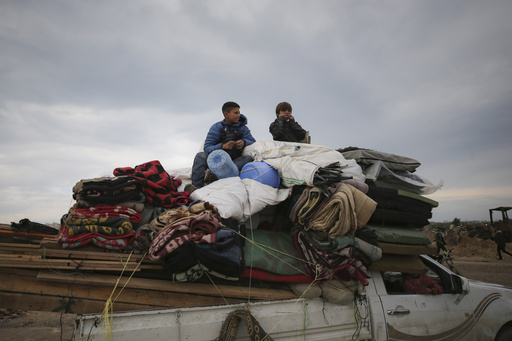JERUSALEM — Hamas has issued a warning regarding the potential postponement of the next anticipated release of Israeli hostages from the Gaza Strip, casting doubt on a precariously held ceasefire that many hoped could signal an end to the ongoing conflict. This news has reignited fears among Israelis, particularly in light of the recent handover of hostages, which saw three visibly malnourished men returned over the weekend. Out of the 17 hostages still awaiting release, Israel has confirmed that eight are not alive.
President Donald Trump responded to Hamas’ announcement by suggesting that the ceasefire should be terminated unless all remaining hostages are freed by midday Saturday, while indicating that the ultimate decision rests with Israel. Hamas dismissed these remarks, insisting that hostages will only be returned if all parties adhere to the ceasefire terms. The next transfer of three hostages was originally scheduled for Saturday, and families of the hostages express growing concern as time is running out for those still alive. Israel is currently anticipating the outcomes of a security Cabinet meeting that was called in response to the developments announced by Hamas.
As uncertainty looms, fear is also escalating within Gaza, where numerous displaced Palestinians have returned to their remaining homes in the northern regions after fleeing at the onset of the conflict. This unpredictability, occurring halfway through the ceasefire’s initial six-week phase, complicates discussions surrounding the more challenging second phase. It also puts at risk the humanitarian relief efforts made possible by the truce, as fears mount that fighting could resume once the first phase concludes in March.
Hamas has accused Israel of failing to uphold its obligations within the ceasefire, citing delays in allowing Palestinians to return to northern Gaza due to prior disputes, as well as military strikes and restrictions on humanitarian aid. The group, which regained control over Gaza following the ceasefire commencement on January 19, announced that the next hostage release would be postponed “until further notice.” Israeli Defense Minister Israel Katz condemned this delay as a blatant violation of the ceasefire agreement and ordered heightened military alertness. Meanwhile, the Israeli government emphasized its intention to fulfill its part of the agreement.
In a later statement, Hamas called the delay a “warning signal” directed at Israel, asserting that mediators such as the United States, Qatar, and Egypt have five days left to encourage Israeli compliance. They also noted that “the door remains open for the exchange to proceed as planned if Israel abides by its obligations.”
In the backdrop of these developments, Trump has proposed a controversial plan concerning the Palestinian population in the now-devastated Gaza, suggesting that the U.S. take “ownership” of the territory without allowing Palestinians the right to return. These remarks have exacerbated tensions, as Palestinians recall the historical context of their displacement during the 1948 war. Arab nations have voiced their disapproval of Trump’s comments, which contradict some statements made by his administration that suggested a temporary relocation for Palestinians.
The immediate focus is on the anticipated release of three Israeli hostages, along with numerous Palestinian prisoners. So far, five exchanges have occurred in a gradual release of 33 hostages, reflecting a delicate trust necessary for facilitating the ceasefire. However, recent releases accentuate the dire conditions endured by those still held captive in Gaza. Families of the freed hostages have recounted horrendous experiences, with reports of individuals being kept in chains or underground for extended periods and subsisting on minimal food.
These vivid accounts have intensified the pressure on Prime Minister Benjamin Netanyahu’s government to initiate discussions for the second phase of the ceasefire, aimed at securing the release of remaining hostages and facilitating a full withdrawal of Israeli forces from Gaza. A doctor allied with the families of the hostages expressed a grave warning on Monday, emphasizing that any delay in their release poses significant risks to their survival.
